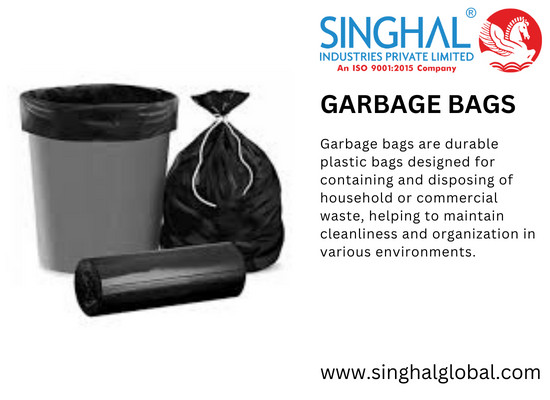Dustbin Bag Manufacturers India, often overlooked yet indispensable, play a vital role in maintaining cleanliness and hygiene in our daily lives. Whether in homes, offices, or public spaces, garbage bags are the unsung heroes that keep our surroundings neat and organized. This article explores the various types, uses, and benefits of garbage bags, along with some frequently asked questions to help you make informed decisions when choosing the right garbage bag for your needs.
Types of Garbage Bags
Dustbin Bags Manufacturers in Ahmedabad come in a variety of types to suit different needs. Here are the most common ones:
Standard Trash Bags: These are the most commonly used garbage bags, suitable for everyday household waste. They come in various sizes and strengths, from small bathroom bins to large kitchen bins.
Heavy-Duty Trash Bags: Designed to hold heavier and bulkier items, these bags are made from thicker plastic and are tear-resistant. They are ideal for garden waste, renovation debris, and other heavy-duty uses.
Biodegradable Trash Bags: As environmental concerns grow, biodegradable bags have become popular. These bags are designed to break down more quickly than standard plastic bags, reducing their impact on the environment.
Compostable Trash Bags: These bags are made from natural materials like corn starch and are intended to be composted along with organic waste. They are a great option for eco-conscious households.
Recyclable Trash Bags: Made from recycled materials, these bags help reduce plastic waste by reusing materials that would otherwise end up in landfills.
Uses and Benefits of Garbage Bags
Dustbin Plastic Bag Manufacturers in India serve multiple purposes beyond just holding trash. Here are some of their key uses and benefits:
Maintaining Cleanliness: Garbage bags keep waste contained, preventing it from spilling and causing messes. This is crucial for maintaining cleanliness in homes, offices, and public spaces.
Hygiene: By keeping waste sealed, garbage bags help reduce the spread of bacteria and unpleasant odors. This is particularly important in settings like kitchens and bathrooms.
Convenience: Garbage bags make it easy to collect and dispose of waste. They can be easily tied up and carried to disposal points, saving time and effort.
Environmental Protection: Using the right type of garbage bag can help mitigate environmental impact. Biodegradable and compostable bags are especially beneficial in reducing plastic pollution.
Specialized Uses: Certain garbage bags are designed for specific types of waste, such as medical or hazardous waste, ensuring safe and appropriate disposal.
Choosing the Right Garbage Bag
When selecting garbage bags, consider the following factors:
Size: Choose a bag size that fits your bin and meets your waste disposal needs. Common sizes include small (4-8 gallons), medium (8-12 gallons), and large (12-16 gallons or more).
Strength: For heavy or sharp items, opt for heavy-duty bags that are tear-resistant. Standard bags are sufficient for lighter household waste.
Material: Consider biodegradable or compostable bags for an eco-friendly option. Recyclable bags are also a good choice for reducing environmental impact.
Closure Type: Drawstring and flap-tie closures are popular for their convenience. Ensure the closure type is easy to use and seals the bag effectively.
Cost: While biodegradable and compostable bags might be more expensive, they offer environmental benefits that can justify the cost.
Conclusion
Garbage bags are a staple in waste management, essential for maintaining cleanliness and hygiene in various settings. By understanding the different types and uses of garbage bags, and choosing the right one for your needs, you can contribute to a cleaner, more organized, and environmentally friendly lifestyle. Whether you opt for standard, heavy-duty, biodegradable, or compostable bags, the key is to use them effectively and responsibly to ensure proper waste disposal and environmental protection.
Frequently Asked Questions (F&Q)
1. What are biodegradable garbage bags, and how do they differ from regular plastic bags?
Biodegradable garbage bags are made from materials that break down more quickly than regular plastic, often through microbial activity. Unlike regular plastic bags that can take hundreds of years to decompose, biodegradable bags are designed to degrade within a few months to years, depending on environmental conditions. This helps reduce long-term plastic pollution.
2. Can biodegradable and compostable bags be used for all types of waste?
While biodegradable and compostable bags are suitable for organic and general household waste, they may not be ideal for heavy or sharp items due to their typically lower strength compared to conventional plastic bags. It's important to check the manufacturer's recommendations regarding the types of waste each bag can handle.
3. Are garbage bags recyclable?
Some garbage bags are made from recyclable materials, but not all types are recyclable. Check the packaging for recycling information. Additionally, many recycling programs do not accept plastic bags, including garbage bags, due to the risk of them getting tangled in machinery. It's best to reuse bags when possible and dispose of them properly if recycling is not an option.
4. How can I reduce my environmental impact when using garbage bags?
To reduce environmental impact, consider using biodegradable or compostable bags, which break down more quickly and reduce plastic waste. You can also reuse bags whenever possible and opt for bags made from recycled materials. Reducing waste overall by recycling and composting can also minimize the number of garbage bags needed.
5. What should I do if a garbage bag leaks or tears?
If a garbage bag leaks or tears, clean up any spills promptly to prevent odors and contamination. Use a stronger or double bagging method for future disposals if you frequently encounter this issue. Heavy-duty bags are more resistant to tears and leaks, making them a better option for heavier or sharper waste.







